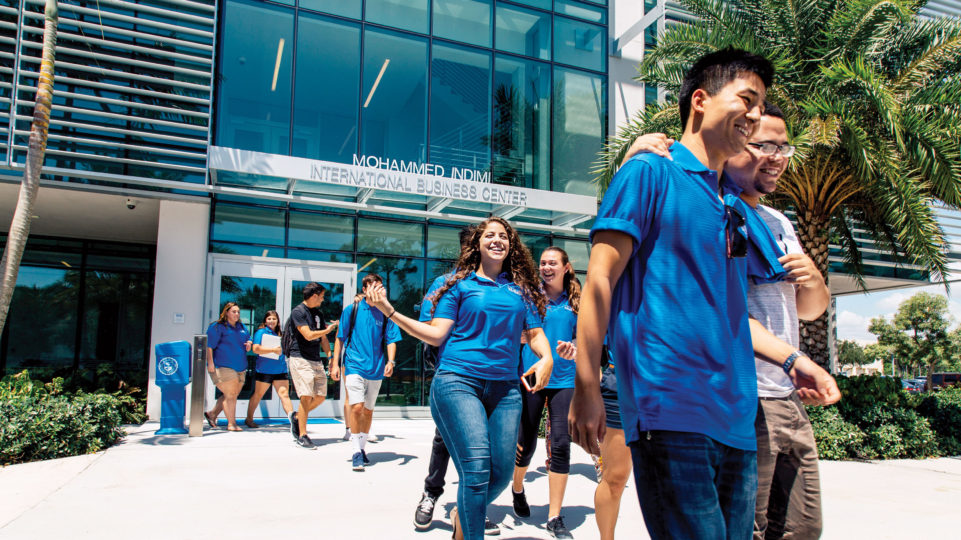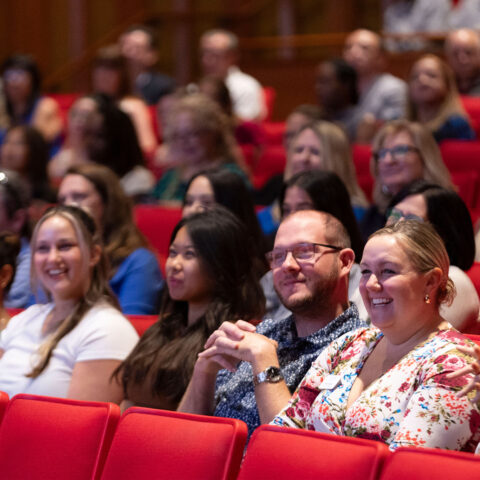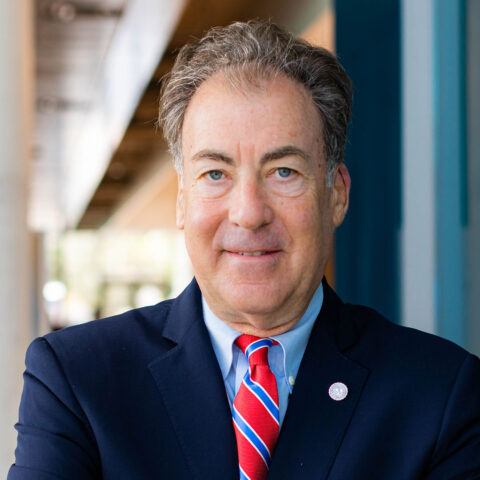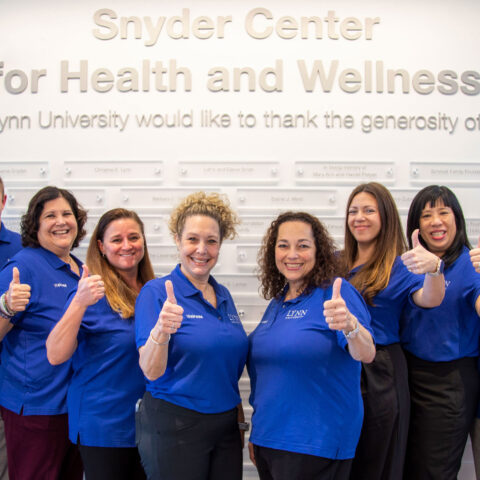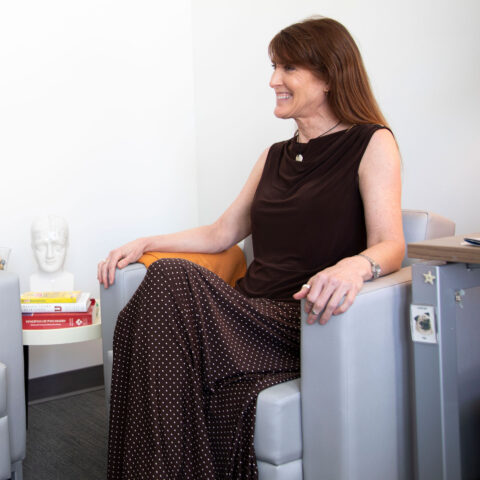Exceptional new and expanded programs that reflect Lynn’s 2020 strategic plan help students maximize the university experience and mark these achievements in their academic lives:
- Settling smoothly into life as a college student
- Accelerating completion of their degree (or multiple degrees)
- Exploring their place in the larger world
“These programs allow students to become more vested in Lynn and more integrated into the community,” said Dr. Gareth Fowles ’99, ’01, vice president for enrollment management.
First 40
No point in a college student’s life is more memorable or more packed with complications than the first semester. The very things that make college thrilling (new roommate! no parents! challenging classes!) can suddenly push a freshman into a cold panic.
“The first six weeks are critical,” said Theresa Osorio, assistant dean for student involvement. “If we can connect them to other students, faculty and staff in those first 40 days, we’ll keep them and they’ll be better students and better alumni.”
And so begins the First 40 program, possibly the best six weeks of any Lynn student’s life.
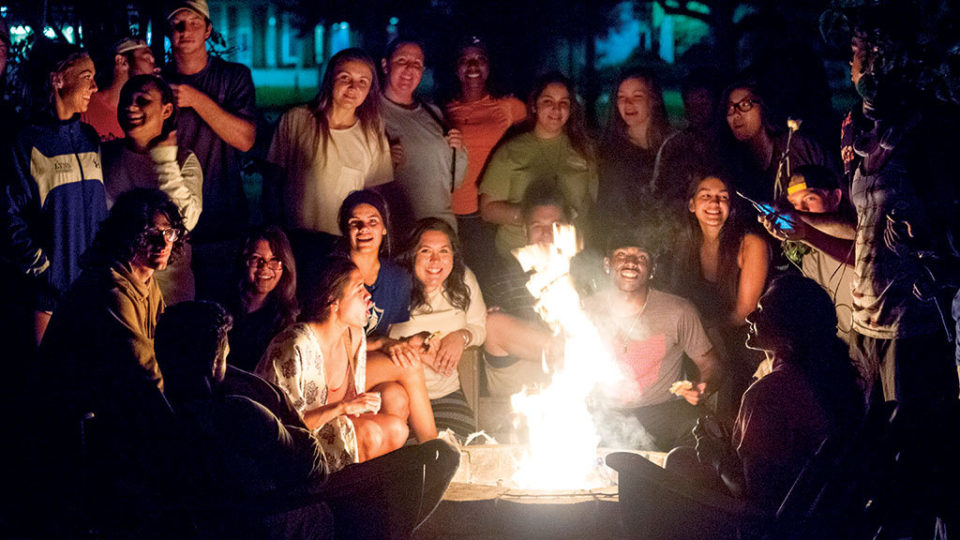
An optional program for first-year students, it picks up where Welcome Weekend leaves off, with nonstop events and explorations to help freshmen settle happily and productively into the life of the campus. Its calendar includes karaoke, laser tag, pool parties, street festivals and a color run.
“We want first-year students to find their niche, their friend group,” Osorio said. “Building relationships is incredibly important.”
Kat Milian, a sophomore studying public relations, was one of the first students to sign up for First 40 as a freshman in its inaugural run in 2015.
“I thought it would be a really cool way to meet people,” she said.
Woven into the cool are First 40’s principles of willpower, self-esteem and accountability. Students are reminded of their responsibilities and resources with programs on appropriate alcohol use, leadership, Lynn’s code of conduct and where to go for help.
“But the events were so fun you didn’t feel like you were getting a lecture,” Milian said.
She is now one of the peer mentors guiding incoming freshmen through their own First 40.
“When freshmen feel proud of their school and feel like they belong here, they’re much happier and do much better in their classes,” she said.
Evaluation leads to the same conclusion. When they arrive on campus, students are given a quiz on the three competencies of First 40. At the conclusion of the program in October, they are tested again on their willpower, self-esteem and accountability.
“We did see a significant increase in these competency areas,” Osorio said.
What’s more, transition programs like First 40 are shown to improve graduation rates.
Caryn Morris, a senior studying elementary education and a peer mentor for First 40, said the program helps new students navigate physically (where do I go to print my essay?), socially (can I join flag football as a freshman?) and academically (how do I change my major?).
“Because it’s based on core competencies, we cover important topics like our amnesty policy and diversity and disabilities,” Morris said. “But because it’s peer mentors delivering that message, it gives students a feeling that they can depend on us, they have someone they can talk to confidentially, someone who can put them in touch with the resources they need. These 42 peer mentors are like your big brothers and big sisters. They can always rely on us.”
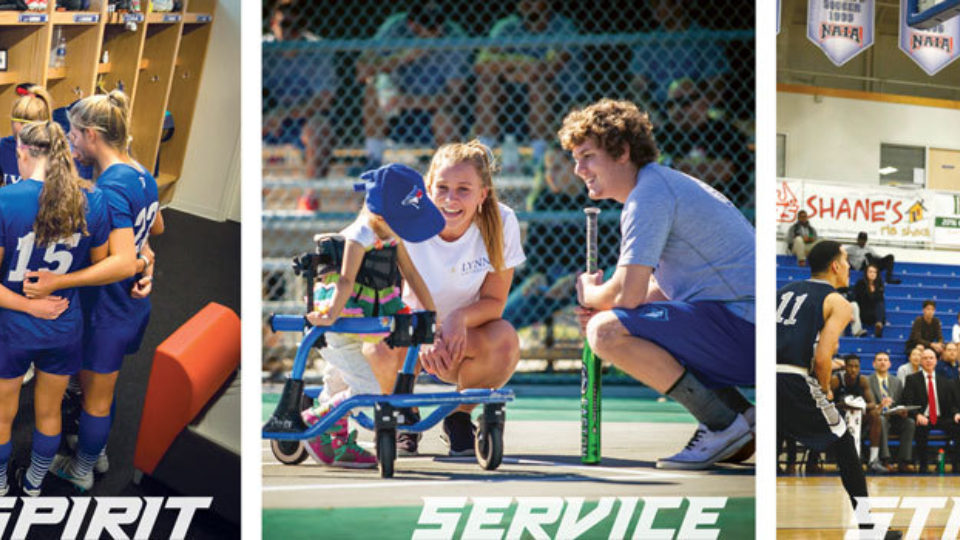
Spirit, Service, Strength Conference
Think of this program as the First 40 Hours, to help new student athletes adjust to life at Lynn and engage in its ideals from the starting bell.
“It’s a dynamic new conference at the beginning of the academic year to introduce all student athletes to our guiding principles of spirit, service and strength,” said Devin Crosby, athletics director. “We want them to recognize and apply those attributes to everything they do at Lynn.”
Beginning the first Tuesday of fall classes, the three-day conference kicked off with Crosby and his coaches welcoming athletes to Lynn’s 15 varsity sports. The first day focused on spirit, the next day service, and finally strength, each with presentations, games and a challenge for student athletes to integrate these values into their decision-making, academics and lives outside of sports.
“We’re committed to our students’ success,” Crosby said. “This conference allows us to explain that commitment to them and to share our values as an institution. We want them to know we’re so happy they chose Lynn.
Accelerated degree programs
Lynn University’s accelerated degree programs give highly motivated students a valuable opportunity: to earn a bachelor’s, master’s or law degree a year sooner. That means saving a year’s worth of tuition and room and board—nearly $50,000—and getting a head start on their careers.
Lynn began the 3-year bachelor’s program in 2009 with 27 students. While it wasn’t the only university to offer an accelerated bachelor’s degree, Lynn found its niche when it evolved from a highly prescriptive program into a more flexible one.
It was a natural progression for Lynn, where learning is individualized, said Dr. Gregg Cox, vice president for academic affairs. “Students have different needs at different times. Our ability to customize the program has been a game-changer. We understand that while the program has one goal—for students to graduate in three years—there are hundreds of paths to get there.”
For example, a student taking two particularly challenging courses in one semester can opt to take five courses rather than the usual six, then take an extra course in the summer. Or a student can take online courses through the iLynn program.
It’s proven to be a winning formula. Enrollment in the 3-year bachelor’s program has soared from 27 in 2009 to more than 515 in Fall 2016. Accelerated students account for over a quarter of undergraduate day enrollment. (The program is available to all majors except music and education.) Even more impressive, retention rates and grades are high.
“Recent retention rates have been between 82 and 88 percent with overall GPAs exceeding 3.0,” Cox said.
The key, said Nick Haggarty ’16, who earned a B.S. in investment management summa cum laude in just 2½ years, is good time management. “It’s a great way to challenge yourself, and I think you get a better feel for the pace and workload in the real world.”
Soon after graduating, Haggarty landed an analyst’s job with JPMorgan Chase & Co. in Wilmington, Delaware.
With the accelerated programs, “it’s all about options,” Cox said. And Lynn’s options extend to the 3+1 master’s and 3+3 law programs. 3+1 master’s is a 3-year bachelor’s plus master’s degree, and 3+3 law is a 3-year bachelor’s plus 3-year law degree in partnership with St. Thomas University School of Law.
Like the accelerated bachelor’s program, the 3+1 master’s is proving popular, and the new 3+3 law promises to do the same. Denisse Rodriguez ’16 is working toward an MBA in marketing and media management in the 3+1 program after earning her undergraduate degree in multimedia journalism. She and others have discovered that accelerated degree programs don’t mean sacrificing a well-rounded college experience.
“I was a little concerned that doing the accelerated program would be too fast, that I wouldn’t get to experience everything I could in four years,” Rodriguez said. “But I have gotten to do so much, including study abroad. It was a great choice for me.”
Fellow class of ’16 member Haggarty completed three business internships, captained the lacrosse team and graduated with the College of Business and Management Dean’s Award for Excellence.
Winston Cunningham, a hospitality major in the 3-year bachelor’s program, is on a similar track. In addition to his studies, he serves as a student ambassador in the Office of Admission, meeting prospective students and their families. Like Rodriguez, he’ll pursue an MBA in the 3+1 program.
“I can get college out of the way and move on to my professional life,” he said. “I am still getting the full college experience and all the fun, but it’s just condensed into a shorter time span.”

Center for Learning Abroad
Launched just four years ago as part of Lynn’s 2020 strategic plan, the Center for Learning Abroad (CLA) is already one of the most successful and popular student programs on campus.
It offers more than 50 study abroad programs in 20 countries, including Italy, Australia, China, Spain, Ireland, South Africa and Argentina. Students can opt for short-term programs, choose semester programs or spend an academic year abroad.
“Copenhagen had the perfect program for me. I didn’t want to go somewhere to be a tourist. I wanted the experience to add to my degree,” said Rodriguez, the 3+1 MBA student.
Rodriguez enrolled in the DIS program in Denmark while an undergraduate. She said her studies in Europe made a real impact on her academic life back at Lynn.
“Professors would ask me how companies in Denmark handle a certain issue and I could share my experiences with them and other students. It added so much to my academics.”
Every study abroad program can be applied to the completion of the student’s degree, and the semester-long and yearlong programs come at no additional tuition cost. Institutional and financial aid may also be applied toward the cost of study abroad, making it a possibility for more students than ever.
Despite not wanting to be a mere tourist during her program in Denmark, Rodriguez did manage to take in the sights. She visited eight countries and even spent some time at the BBC in London as part of her strategic communications studies.
“Since I came to Lynn from the Dominican Republic, I felt like I was already studying abroad. But I realized that Lynn’s programs in Europe could give me great experience I could apply to my career.”
Since its 2012 creation, the CLA has seen a sharp increase in participation in overseas study. According to Stephanie Clark, the center’s education abroad adviser, 2015–16 saw a 42 percent increase over the previous academic year in terms abroad. In last year’s fall semester alone, the number of students participating in study abroad tripled compared to Fall 2013.
The most popular study destination? Italy, followed by England and Australia.
Brian Pirttima, director of the CLA, said Lynn bucks the national trend toward short-term programs. Although nationally only about 38 percent of students studying overseas choose long-term programs, almost 50 percent of Lynn’s study abroad students opt for semester-long and yearlong programs. Since 2013, the number of Lynn students participating in these longer-term programs has more than doubled.
“A longer program provides greater opportunity for personal transformation and academic growth,” he said. “It’s the difference between living abroad, albeit temporarily, and simply taking a quick trip of three or four weeks.”
Of all of CLA’s accomplishments in its first four years, Pirttima is most proud of this change.
“Lynn students are choosing to go farther and staying longer to grow and learn more,” he said. “That’s our best achievement.”
Fowles said connecting the programs more effectively to academics is a strong selling point for Lynn.
“The new programs are more enticing and the academic content is more enriching than ever before,” he said. “The breadth and depth of the diversity in the program and the additional geographic locations really resonate with students.”
Keeping their passports up to date could also help their grades. According to the Georgia Learning Outcomes of Students Studying Abroad Research Initiative, students are more likely to graduate —and with a higher GPA—if they study abroad. At Lynn, this has certainly been true. Since the CLA opened, more than 90 percent of the students who have participated in study abroad have graduated or remain enrolled at Lynn. By comparison, the national graduation rate hovers just under 60 percent.
“Come to Lynn, study abroad with Lynn,” Pirttima said, “and you’re very likely to graduate from Lynn.”
Travel advisories
- The Center for Learning Abroad will offer more than $90,000 in scholarships for qualified study abroad students for the academic year.
- Beginning in 2016, freshmen became eligible to study abroad for January Term and the spring semester.
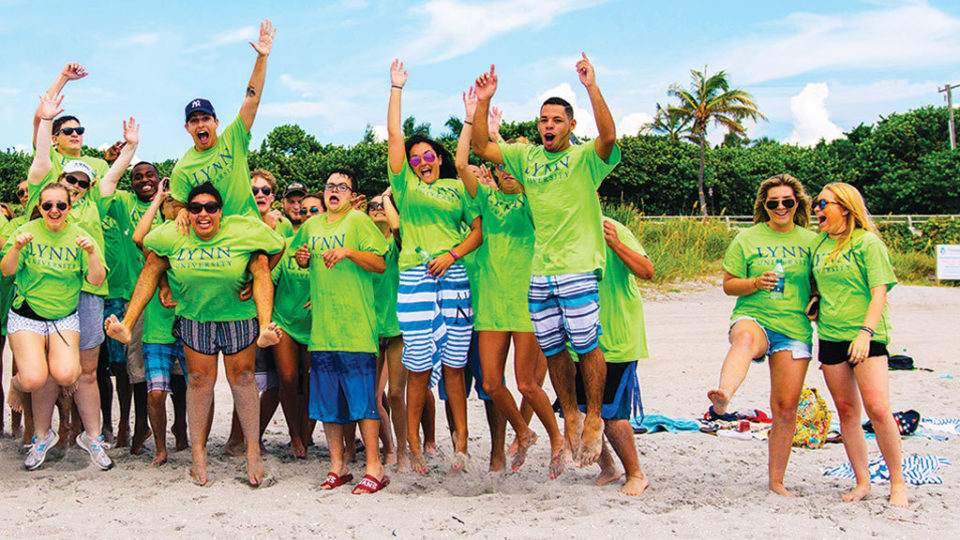
Meet the class of 2020
Because Lynn’s strategic plan is ultimately in the service of its student body, we thought you’d like an introduction to our incoming class.
They will graduate, coincidentally, in 2020.
3.03 Average high school GPA
562 Number of incoming first-year students
97 Percentage of new students who say career preparation is important to them
92 Percentage of new students who say Lynn was their first or second choice for college
Top countries Brazil, United Kingdom, China, Spain, Venezuela, Germany, Italy
